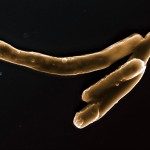Link to Pubmed [PMID] – 12068013
J. Biol. Chem. 2002 Aug;277(35):31335-44
We examined the function of the pimA (Rv2610c) gene, located in the vicinity of the phosphatidylinositol synthase gene in the genomes of Mycobacterium tuberculosis and Mycobacterium smegmatis, which encodes a putative mannosyltransferase involved in the early steps of phosphatidylinositol mannoside synthesis. A cell-free assay was developed in which membranes from M. smegmatis overexpressing the pimA gene incorporate mannose from GDP-[(14)C]Man into di- and tri-acylated phosphatidylinositol mono-mannosides. Moreover, crude extracts from Escherichia coli producing a recombinant PimA protein synthesized diacylated phosphatidylinositol mono-mannoside from GDP-[(14)C]Man and bovine phosphatidylinositol. To determine whether PimA is an essential enzyme of mycobacteria, we constructed a pimA conditional mutant of M. smegmatis. The ability of this mutant to synthesize the PimA mannosyltransferase was dependent on the presence of a functional copy of the pimA gene carried on a temperature-sensitive rescue plasmid. We demonstrate here that the pimA mutant is unable to grow at the higher temperature at which the rescue plasmid is lost. Thus, the synthesis of phosphatidylinositol mono-mannosides and derived higher phosphatidylinositol mannosides in M. smegmatis appears to be dependent on PimA and essential for growth. This work provides the first direct evidence of the essentiality of phosphatidylinositol mannosides for the growth of mycobacteria.

